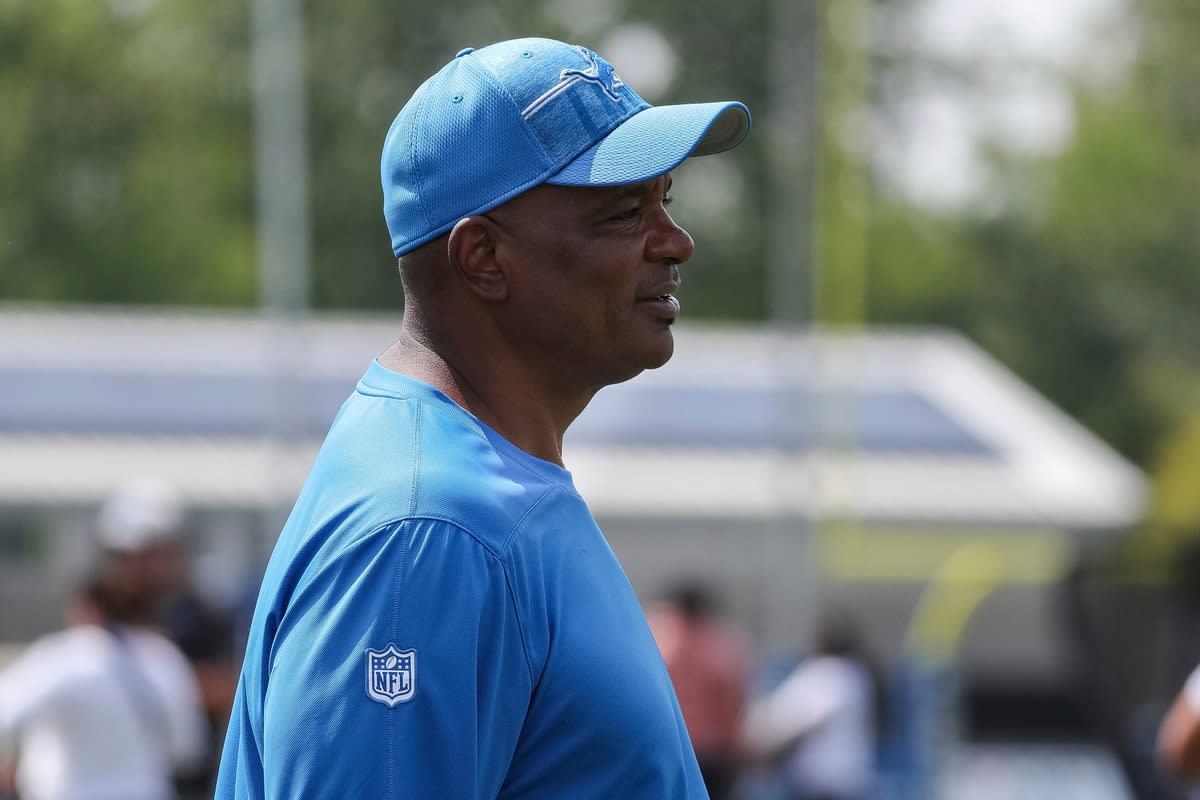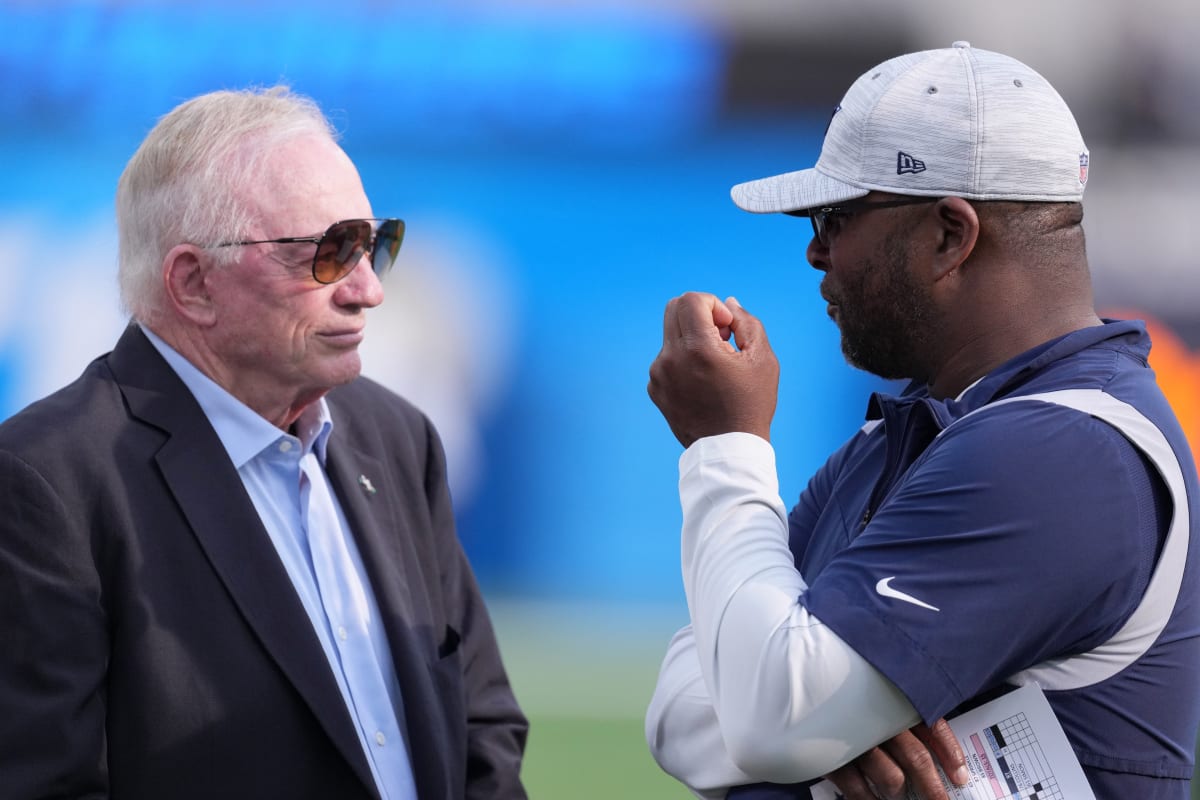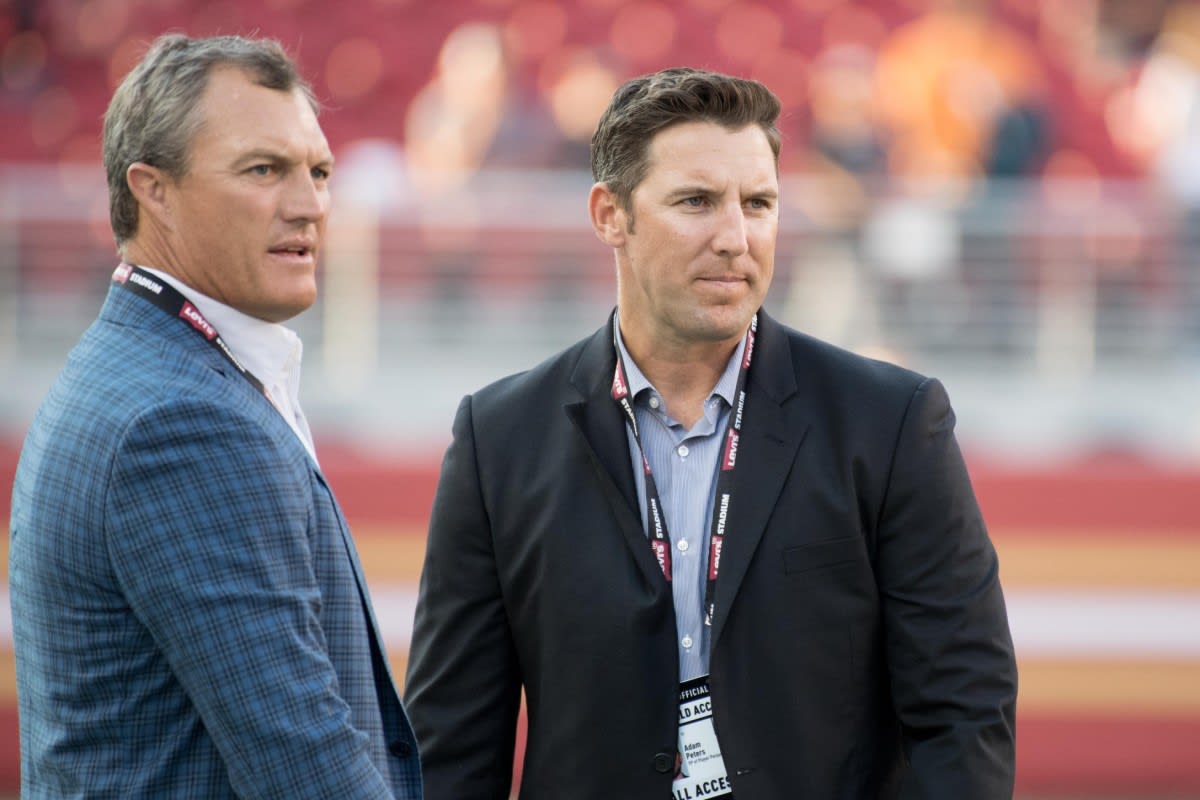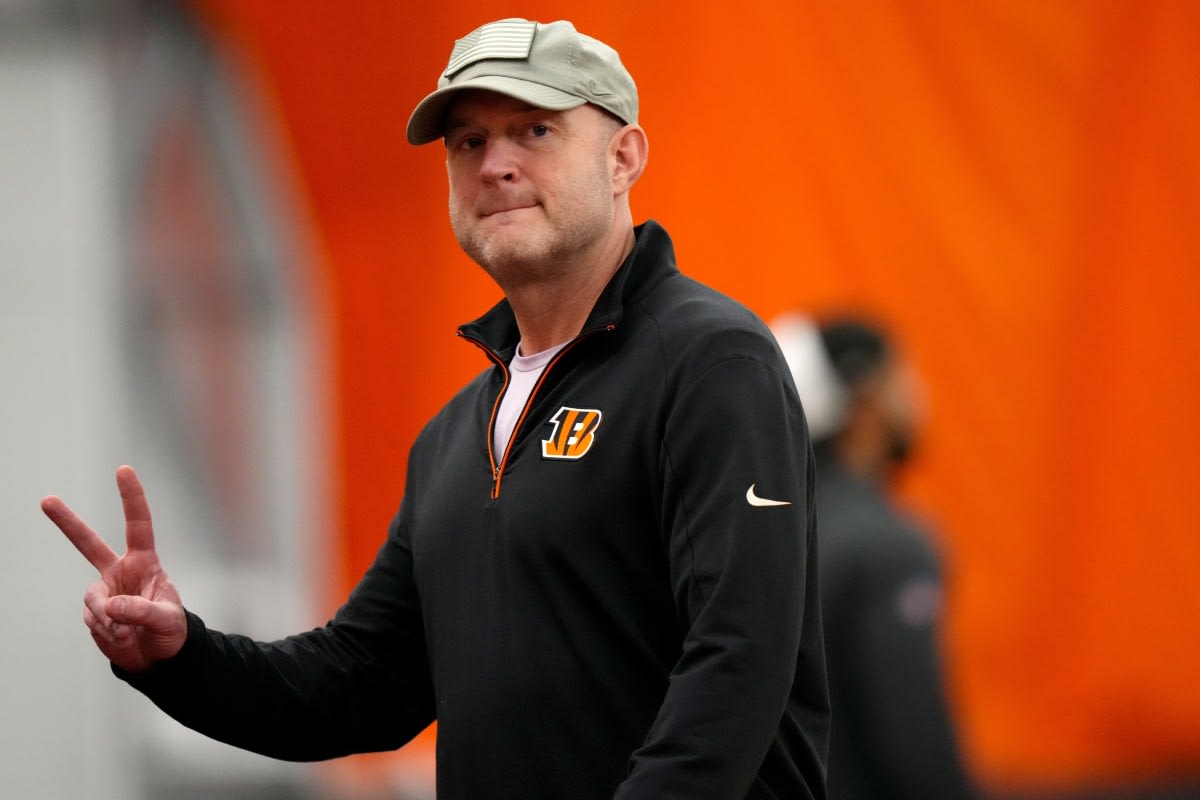How much bigger has the GM job gotten?
One team president considered that question Wednesday night, raising how the NFL has thought of splitting the commissioner’s job into two posts, one for business and another for football. And he said the same idea could be pondered for teams hiring a GM for a very specific reason: The number of hats a GM needs to wear can often lead to not putting the one on that got the person the job.
“You wind up losing who you hired,” the president said.
So as I looked at assembling my 15th annual future GMs list over the past couple of weeks, that was at the center of all of this—there are going to be corners each of the candidates below haven’t had to look around yet in their careers. Which is why, in focusing this list, we tried to find a variety of candidates from the scouting side, cap side or the analytics side.

Junfu Han/USA TODAY NETWORK
For a fan, thumbing through a list like this is done through the lens of Kevin Costner’s character in Draft Day—looking for the right guy to stock your team’s roster. What the producers of the movie didn’t show you, though, was Sonny Weaver having to manage salaries, synthesize scouting with analytics and data, work through issues in the locker room or find someone to cut the grass.
“It’s way more than just picking players,” said one AFC GM on Wednesday. “There’s plenty of GMs that were good talent evaluators that couldn’t put it all together. It’s leadership. It’s a CEO job. … When s--- happens, you can’t just go close your door. You gotta get out in front. You got to lead. You got to work through it.”
You’ve got to, most of all, manage. And there’s a great story on that from Chicago from two years ago.
Ryan Poles still had a lot to learn at that point, a couple of months into the job as Chicago Bears GM. But he knew enough to know the sensitivity around Justin Fields’s standing as his quarterback. So he invited Fields into the draft room, showing him his board, and explaining ahead of time why he might not draft a receiver early in the NFL draft.
Poles did it to make Fields feel involved, and it paid off in how he, Matt Eberflus and the quarterback were able to build a relationship, and get the locker room through a tough first year ending with a nine-game losing streak. Fields, and the team, have gotten better since.
It was a little thing, yes. But an example, too, of just how big, and all-encompassing, these jobs are, especially for a first-timer whose head is spinning.
“I know the skills you need to have in this job,” said another AFC GM. “And the biggest skill is experience doing a lot of things, and dealing daily with your players, and working with your head coach and owner.”
So that’s where we’ll get started—with that acknowledgment, and one that second-chance candidates such as Jerry Reese, Thomas Dimitroff, Ryan Grigson, Scott Pioli, Jeff Ireland, Jon Robinson and Ray Farmer (with Grigson, Ireland and Farmer having reestablished themselves winning with new teams) should at least merit a look based on this premise.
Also, a couple of qualifiers. One is that there are a few guys (Champ Kelly in Las Vegas and Dave Ziegler in New England) that may have a shot in specific places that didn’t make the list. Another is that, in having to pare down the list, there are some excellent candidates (Dan Morgan in Carolina) that didn’t make it because of where their teams stand.
And with that, here you go …
Ray Agnew, assistant GM, Detroit Lions: Agnew has an interesting background as a candidate on this list—once a top-10 pick, the old defensive tackle transitioned to an off-field role with the Rams after winning a Super Bowl with them in 1999, then retired after the 2000 season. His 18-year rise through the administrative side included stints as team pastor, director of player development, assistant pro scouting director and, finally, pro scouting director. Brad Holmes took him to Detroit with him, where he’s been an invaluable resource with a unique eye in player evaluation, and as a unifying force with a low-key Ozzie Newsome–type of presence.
Matthew Berry, senior director of player personnel, Seattle Seahawks: Berry’s long been seen internally as a top-notch evaluator, and was promoted last spring after nearly a decade as the team’s college scouting director. Over the past couple of years—buoyed by the capital that came back in the Jamal Adams trade—Seattle has built a rock-solid base of young talent, putting the team in position to contend on an annual basis. Coming up on the college side, his blind spot would be lack of time in the office, but he’s shown plenty of ability there over the last year, with a highly organized approach to scouting and setting up a department.
Mike Borgonzi, assistant GM, Kansas City Chiefs: Borgonzi has been GM Brett Veach’s No. 2 for seven seasons and has seven division titles, three AFC championships and two Lombardi Trophies won over that time. He was initially hired in Kansas City in 2009 by Pioli, which gave him four years in a Patriots-style program before Andy Reid arrived in ’13. He’s done just about everything in his time—and as a result, the former Ivy League fullback is about as well rounded (and ready) a candidate as you’ll find.
Chad Brinker, assistant GM, Tennessee Titans: In his first year with the Titans, Brinker has a unique background, toggling between scouting and cap-analytics coming up in Green Bay. He has also worked in both pro and college scouting before working closely with longtime Packers lead negotiator Russ Ball over his past six years there. As part of that last assignment, Brinker received an MBA from Northwestern, giving him the sort of business-football blend in background that will appeal to owners. Is he ready? It’s a fair question. But his time is coming.
Brandon Brown, assistant GM, New York Giants: Despite the dip this year from his team, Brown, who’s one of the youngest guys on this list, is seen as a riser both in that organization, and the league, as the right-hand man to Joe Schoen. After starting his career as personnel man with the Colts, and with a law degree in hand, Brown went to Philadelphia, and quickly started to climb the ladder on the pro scouting side, becoming director in 2019, then director of player personnel in ’21. It’ll probably take another year or two, and some more Giants wins, but Brown’s time is coming.
Trey Brown, senior personnel executive, Cincinnati Bengals: Brown has been an essential part of the Bengals’ build over the past three years, with Cincinnati aggressively taking advantage of Joe Burrow’s rookie-contract window to build a roster strong enough to contend for titles in 2021 and ’22, and even be a playoff-caliber team without its quarterback for a good chunk of this year. Brown and other well-respected guys such as Mike Potts and Steve Radicevic have responsibility in all areas, providing good experience for bigger jobs. And Brown’s also worked for Bill Belichick in New England, and Howie Roseman in Philadelphia, and has held decision-making positions in the AAF and XFL. His ties to Jerod Mayo could eventually lead him back to the Patriots.
Glenn Cook, assistant GM, Cleveland Browns: The former University of Miami linebacker has interviewed for the Chicago Bears, Minnesota Vikings and Titans jobs over the past two offseasons. He has proved himself in the forward-thinking Cleveland personnel department, integrating analytics and data into the old-school football background working for Bill Polian, Ted Thompson and John Dorsey. And Cleveland’s ability to withstand a bunch of injuries this season to make the playoffs this year is a shining example of the strength of the roster that Cook helped GM Andrew Berry build.
Ian Cunningham, assistant GM, Chicago Bears: Cunningham was on the cusp of landing the Arizona Cardinals job before pulling his name out last year. He interviewed in Tennessee, too, and that was without the results the Bears are getting now in the rebuild he has helped orchestrate alongside GM Ryan Poles. Cunningham came from Philly, where he was college director and assistant director of player personnel for Howie Roseman. He also worked under Ozzie Newsome in Baltimore, where he worked his way into a position as Southeast area scout—a post that Newsome, the Alabama legend, didn’t staff lightly.
Ed Dodds, assistant GM, Indianapolis Colts: The NFL’s road scouts universally see Dodds as one of the league’s most connected and talented evaluators—his role in Seattle helping build the Legion of Boom before he arrived in Indy. As the Colts’ assistant GM, he’s been a part of a playoff contender under two different coaches, and has been Chris Ballard’s most trusted lieutenant (with Morocco Brown right there, as well). It’s worth keeping an eye on Las Vegas with Dodds. The Raiders really liked him after he interviewed there in 2022, and he has connections to Jim Harbaugh, who could be a target.
Terrance Gray, director of player personnel, Buffalo Bills: Brandon Beane’s scouting pipeline has Gray up next—and Gray impressed the NFL people he’s met with the past couple of rounds at the front office and coach accelerator program. Gray worked on the college scouting side under former Vikings GM Rick Spielman and former assistant GM George Paton in Minnesota (now Broncos GM), and continued with that when Beane hired him as college scouting director in 2017. He was named assistant director of player personnel in ’20, then moved into his current role, taking on a more prominent position in pro scouting when Joe Schoen left to take the Giants’ GM job in ’22. Gray’s polished and has steadily become more and more complete as an exec.
Mike Greenberg, assistant GM, Tampa Bay Buccaneers: He came up on the cap side, but he has done more crossing over as he closes out his 14th season with the Tampa organization. For years, the Bucs had the NFL’s cleanest cap, and Greenberg was able to help them pivot to a win-now model during Tom Brady’s three years. But this year came with a big reset of the cap. Greenberg also brings experience working in the league office, which will appeal to some owners.
Alec Halaby, assistant GM, Philadelphia Eagles: It’ll take a gutsy owner willing to depart from football norms to hire Halaby—the Harvard alum’s background, as a Roseman protégé, is almost completely on the analytics side. He’s incredibly smart when it comes to integrating data into football evaluation, allocating resources and managing a roster. Can he lead a room filled with football scouts and find a coaching staff that’ll be all in on his approach? Fair or not, those will be the questions.
Khai Harley, assistant GM/VP of football operations, New Orleans Saints: Over the years, the Saints have shown an ability to maintain a top-heavy roster while taking care of their own. Harley has been instrumental in GM Mickey Loomis’s ability to do all of that through the Sean Payton years and now through Dennis Allen’s first two years. There could have been plenty of rumblings if Payton could have taken Harley with him as GM when the former Saints coach was considering his options, which is a nice affirmation of how he sees Harley.
Joe Hortiz, director of player personnel, Baltimore Ravens: If there were rankings within this list, Hortiz would be up there at the top with just a few others. Hortiz came up as a college scout like Baltimore GM Eric DeCosta and Jets GM Joe Douglas. After Newsome departed, he moved into DeCosta’s old No. 2 spot and assumed more responsibility. He’s another top exec with old-school roots in a new-age organization—the Ravens are as progressive as any team in their approach—and has been right there with DeCosta and John Harbaugh in building what might, at this juncture, be the NFL’s best team.
James Liipfert, executive director of player personnel, Houston Texans. Liipfert started his career as a college scout in New England, and had a reputation there similar to Dodds’s in Seattle—as a sort of a secret weapon for a championship organization. Bill O’Brien, having been with the Patriots, knew it, and poached Liipfert in 2018 to be his college scouting director. Since, Liipfert’s old boss from New England, Nick Caserio, has taken over, and Liipfert has risen through the ranks. He may be a year or two away, but he’s one of the game’s rising young execs.
Nick Matteo, VP of football administration, Ravens: The Carolina Panthers sought an interview with Matteo a couple of years ago. It was surprising to a lot of people, and even now it’s probably early for him. But Matteo, after eight years in the league office and time spent on the NFL’s Management Council, has quickly become an important part of the Ravens’ football operation. But, again, he’s worked on the team side for only five seasons, which is very light for a GM candidate.

Kirby Lee/USA TODAY Sports
Will McClay, VP of player personnel, Dallas Cowboys: McClay is, in a lot of ways, the Dallas GM—he just doesn’t have the title (the guy who does signs his checks). Still, there’s little dispute in league circles on just how vital McClay has been to the Cowboys’ success. “Will has done a magnificent job there,” an NFC GM said. “Just look at the history of who he’s drafted and signed.” Indeed, there’s a reason why Dallas consistently has one of the NFL’s very best rosters, and he’s another that would be among the elite on this list. Jerry Jones has really taken care of him, and he loves Dallas. But I think he eventually takes his shot elsewhere, and you wouldn’t want to be the team that didn’t ask. McClay has also done a good job developing scouts, such as college director Mitch LaPoint and pro director Alex Loomis.
Jim Nagy, executive director, Senior Bowl: The sort of executive experience we detailed above has been central to Nagy’s job over the past six years. He’s had to manage a staff and a budget, be the face of an operation, hire scouts, recruit players and, yes, be a talent evaluator, too. He’s also had to build relationships with every NFL team, every major college program and agents to get his game where it needs to be annually. All of that experience, plus his time working as a scout for the Patriots, Chiefs and Seahawks before arriving in Mobile, Ala., is applicable to the breadth of roles a GM has to play.

Kyle Terada/USA TODAY Sports
Adam Peters, assistant GM, San Francisco 49ers: The only thing Peters hasn’t accomplished in six years in San Francisco is win a title (and that might be coming). The former UCLA player cut his teeth as a college scout in New England, rose as a personnel man in Denver under Josh McDaniels and then John Elway, and grew into a well-respected exec in San Francisco going to Super Bowls with all three teams. Peters nearly got the New York Giants’ job two years ago, and turned down interviews with the Titans and Cardinals last year. So he won’t leave a good situation for just any job (but the native Californian could be an interesting match for the Los Angeles Chargers, or even the Patriots).
Catherine Raîche, assistant GM, Cleveland Browns: She’s drawn respect from her peers for her ability to build and execute a strategic vision, something she first culled as a top executive for the Montreal Alouettes and Toronto Argonauts. Raîche was hired from there by Roseman. While she was at the Eagles, she also worked under Andrew Berry, who took her to Cleveland to lead football operations, a role he had in Philly. She’s shown acumen in scouting, contract management and player development, and is a pretty decent bet to, eventually, become the NFL’s first female GM.
Jake Rosenberg, VP of football administration, Eagles: Rosenberg came up on the contract side, and Philly has done magic with its football operations—consistently one of the cap-healthiest teams in the league, even when stocked with big names and big-money quarterbacks. As part of his job, Rosenberg’s had to work with ownership, and with different departments in properly valuing players and helping Roseman to manage the roster. He also has a business background that will appeal to owners.
Kyle Smith, assistant GM, Atlanta Falcons: The son of former Chargers GM A.J. Smith, the Atlanta exec was, years ago, seen as a future GM. After years in Dan Snyder’s Washington, he has seen his stock rebound in a new place. Teams have tried to poach him—which is one reason why Terry Fontenot promoted him in the spring (assistant GMs can’t leave for anything but GM jobs without permission). Niners coach Kyle Shanahan is a proponent, and even explored trying to hire Smith a couple of years ago when GM John Lynch considered walking away.
John Spytek, assistant GM, Buccaneers: He’d be there with Borgonzi, Hortiz, McClay and Peters on the highest of this list. Spytek is another experienced evaluator who has worked for the league’s best organizations. His first full-time job in the league was for the Eagles. He then was hired by Mike Holmgren and the late Tom Heckert in Cleveland, and spent three years (and won a Super Bowl) with Elway in Denver. In Tampa he’s been alongside Jason Licht in building a championship roster, and luring his former college teammate Tom Brady to Florida.
Jon-Eric Sullivan, VP of player personnel, Green Bay Packers: The son of longtime NFL receivers coach Jerry Sullivan, Jon-Eric spent nearly two decades with the Packers, working his way through the ranks as a college scout, and into the executive offices with a lot of his work going into the team’s stellar draft record over the past decade. Sullivan’s one of a few qualified names in Brian Gutekunst’s well-stocked department (director of football operations Milt Hendrickson is another—Hendrickson came over in 2019 from Baltimore, where he was instrumental in the team’s selection of Lamar Jackson).
Nolan Teasley, assistant GM, Seahawks: Promoted last year from his old post as pro scouting director, Teasley has spent the entirety of his time in the NFL working his way through John Schneider’s personnel department, mostly on the pro side. He’s proven to be strong as an evaluator, and an innovator in the way he handles his evaluations—with a new-age eye for talent. He may be a couple of years away but has garnered the respect of those around him.
Brandt Tilis, VP of football operations, Kansas City Chiefs: One veteran GM I was texting with earlier this week called Tilis “really special” as a personnel guy. By trade, Tilis has come up on the cap-analytics side. But he’s made an impact across the board for the Chiefs, negotiating Patrick Mahomes’s unique contract, helping Veach and Borgonzi rework the roster around it, while rebuilding the defensive and offensive lines. He’s a little outside the box, yes. But he did interview for the Panthers job a few years back and should be in the mix for more soon.

The Cincinnati Enquirer/USA TODAY NETWORK
Duke Tobin, director of player personnel, Cincinnati Bengals: Like McClay, he works in an organization where the owner retains the GM title—and so he, as the top personnel guy, does a lot of GM-like things without being the GM in name. Still, Tobin led the Bengals’ personnel staff through distinct builds, the first around Andy Dalton and the second around Joe Burrow, with different coaches, and a lot of success. Also, with the small scouting staff, there’s a lot on his plate, and he’s shown an ability to manage all of it. That said, he’s comfortable in Cincinnati. And with Burrow there … why leave?





